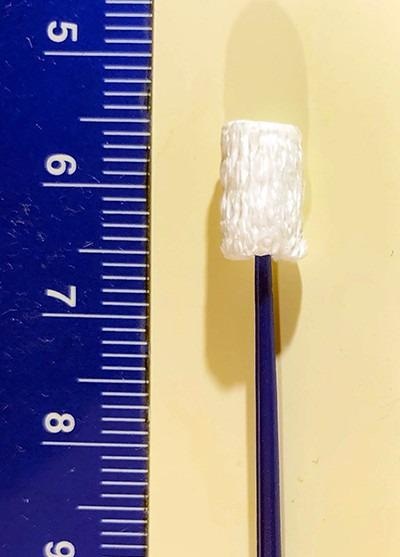Jan 28 2021
The early contact tracing, treatment, and reduction of viral spread necessitate quick, sensitive diagnosis of COVID-19. But some people infected with SARS-CoV-2 obtain false-negative test results, which may lead to health risks for themselves and others.
 A new type of nanofiber swab could improve sample collection and test sensitivity for SARS-CoV-2 and other biological specimens; ruler at the left shows centimeters. Image Credit: Adapted from Nano Letters 2021, DOI: 10.1021/acs.nanolett.0c04956.
A new type of nanofiber swab could improve sample collection and test sensitivity for SARS-CoV-2 and other biological specimens; ruler at the left shows centimeters. Image Credit: Adapted from Nano Letters 2021, DOI: 10.1021/acs.nanolett.0c04956.
Scientists have now designed ultra-absorptive nanofiber swabs that can decrease the number of false-negative tests by enhancing test sensitivity and sample collection. The study results have been reported in the Nano Letters journal from the American Chemical Society.
The currently used most sensitive test for COVID-19 involves the use of a long swab to pick up a specimen from deep within a patient’s nose, where a technique known as reverse transcriptase-polymerase chain reaction (RT-PCR) is then used to detect SARS-CoV-2 RNA. However, in the case of low viral load, which can take place early at the time of infection, the swab might not collect adequate virus to be detectable. Jingwei Xie and his collaborators intended to create a nanofiber swab with the ability to absorb and then discharge more viruses and other biological specimens, thereby enhancing the sensitivity of diagnostic tests.
The team made use of an electrospinning method to create 1-cm-long cylinders formed of lined up nanofiber layers, which were coated with a thin layer of gelatin and attached to plastic swab sticks.
During tests in the laboratory, the porous nanofiber cylinders absorbed and discharged more DNA, bacteria, cells, proteins, and viruses from liquids and surfaces compared to the cotton or flocked swabs that are generally used for COVID-19 testing.
The researchers diluted the SARS-CoV-2 virus, swabbed the liquid samples, and then tested for viral RNA with the help of RT-PCR. In contrast to the two other swab types, the nanofiber swabs decreased the false-negative rate and detected SARS-CoV-2 at a 10-times lower concentration.
According to the researchers, besides enabling more precise and sensitive COVID-19 testing, the nanofiber swabs have extensive prospects in diagnosing other diseases, testing for foodborne illnesses, and enabling forensic teams to determine crime suspects from minuscule biological specimens.
The researchers declare financial support from the University of Nebraska Medical Center (UNMC), the National Institute of General Medical Sciences, and the UNMC College of Medicine COVID-19 Rapid Response Grants.
Journal Reference:
McCarthy, A., et al. (2021) Ultra-absorptive Nanofiber Swabs for Improved Collection and Test Sensitivity of SARS-CoV-2 and other Biological Specimens. Nano Letters. doi.org/10.1021/acs.nanolett.0c04956.